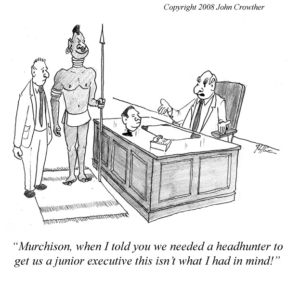What Recruiters Wish Hiring Managers & Candidates Knew About Recruiting
From time to time, a guest writer will appear in this blog. This post is by Allan Erickson, President of Talentmatch. It resonates for me. He has put into words what I have felt for nearly 4 decades in the recruiting business. Thank you, Allan, for graciously allowing us to post it.
—————————————————————————————————————————————————————
Recruiting is a lot like playing solitaire: everything must be perfectly lined up, the slightest hitch means the game is over, and you lose more often than win.
I work virtually, and alone. My only connection to the outside world is via email and telephone. Rarely do I see a candidate or hiring manager face to face. Consequently, I have to operate like a blind man, using all senses except sight, smell, taste and touch. That leaves me with hearing. Oh, I use sight to read emails of course, but that too is mostly a matter of hearing. I work alone, but not in a vacuum. At best what we as recruiters do is act as matchmakers, encouraging a little romance where there’s mutual interest, and increasing the probability of a good marriage.
Communication is key: frequent and clear communication is optimal.
My profession can be especially challenging for other reasons: most everyone at one time or another is suspicious of recruiters. This is understandable. We are fringe factors, integral but not integrated, influential but not altogether accountable. Trust is therefore crucial.

“Headhunter” traditionally refers to a person in the jungle who stalks human beings, kills them, and boils ’em up for dinner. This places recruiters pretty much at the level of cannibals, a few pegs lower than lawyers, politicians, used car salesmen, garbage collectors and process servers. When people say, “Oh, you’re a headhunter,” I try to explain that I truly work to elevate my activities away from predation, toward the agrarian, preferring the negotiating table to the chopping block. Only consistent performance over time will persuade a skeptic that you are not a cannibal.
I try to thoroughly understand what the client wants, what the candidate wants, and work to find good matches to accomplish win-win outcomes. It’s all matters of trust. And with any human endeavor, based largely on human behavior, the outcomes are sometimes lose-lose.
I’ve had candidates accept offers and bail out at the last minute, taking a job elsewhere, leaving me looking poorly in the eyes of the client for an outcome I had no control over. I’ve had managers hire candidates and refuse to pay my fee. I’ve had managers accuse me of trying to simultaneously recruit for and against them, something I don’t do and consider unethical and inappropriate. Still there’s the fear and suspicion at times. I’ve had candidates go in and totally blow an interview by dressing or behaving inappropriately. Client phone calls pointing this out, though rare, are nonetheless embarrassing. Unfortunately I have also had the sad experience of hiring managers who believe the best way to conduct an interview is to verbally assault candidates. Needless to say, once I discover this is happening, I don’t send any more candidates into the lion’s den.
Interestingly I’ve never had a candidate come back and get in my face about helping them find a job. After thousands and thousands of interviews and hundreds of placements, this is a source of great satisfaction. My ultimate payoff is when the candidate and client alike are glad to be working together, achieving mutual success.
I certainly don’t want to leave the impression that hiring managers are the problem. The vast majority are interested in building their organizations through the legitimate use of a recruiter and sound hiring practices. The vast minority are problem children.
But even the best hiring managers miss a cue here and there. If you trust your recruiter, take his or her word (backed with documentation of course) that the candidate being presented is worthy of serious consideration. What most hiring managers don’t realize is that the recruiter has likely been through hundreds, if not thousands of resumes, has sent innumerable emails, and conducted countless canvassing calls to find one or two qualified/interested/available candidates. If you don’t trust your recruiter, why are you working with him?
Essentially recruiters are called upon to be all things to all people, which is, insane!
– career counselor for candidates
– hiring consultant for managers
– negotiating agent for candidates
– advocate for clients
– occasional HR consultant for client companies
– job description consultant/writer
– compensation consultant
– appointment setter
– appointment canceler
– diplomat both ways
– private investigator both ways
– a sounding board, a whipping post, a shoulder to cry on
(I think I should be paid much more!)
My focus has been the realization that I’m dealing with peoples’ livelihoods, an awesome responsibility.
In part, the candidates I present for employment consideration, and the hiring managers I serve, rely on me to give them good advice, and that advice can greatly enhance their ability to earn a living, or it can hurt them substantially if poorly compiled and lent.
Consequently, I do my level best to communicate accurately and openly, acting as a conduit so that eventually, candidates and managers can do the deep discovery and make good decisions themselves, all the while realizing that much of the process and its outcome are a matter of perception. I don’t know everything the hiring manager knows and so I don’t second-guess hiring decisions.
My job is to understand, and then seek to be understood. I encourage clients and candidates alike: trust me, communicate with me and great things may happen, but nothing good comes from fear and suspicion, so if my ceiling is your floor, don’t walk all over me, just show me the door, or better yet, coach me some more!